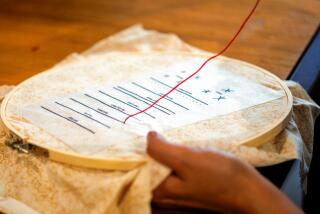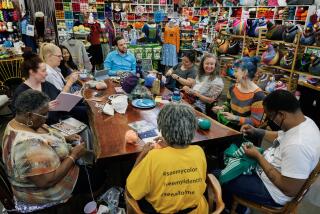Chicago Project That Supplies Americans With New Threads Is Helping India Poor
CHICAGO â Delicate threads are linking the affluent suburbs of Chicago and the poverty-ridden slums of India, in a project started by an Indian social worker.
Pushpika Freitas, 31, describes her plan to market the clothing and other handiwork of her native land as âcapitalism with a conscience.â
âWhat weâre doing is not only selling products and helping people in India, but also educating some of the people here about the different conditions there,â Freitas said.
âThereâs the whole aspect of brotherhood and sisterhood, identifying with people on the other side of world who live in very bad conditions but would really want to change their lives or improve themselves.â
Freitas, who divides her time between Bombay and Chicago, founded the nonprofit group called âMarketPlace: Handwork of Indiaâ in 1986, to provide a marketing outlet in the United States for the handmade crafts and clothing items.
Since then, the volunteer agency has promoted the sale of about $20,000 worth of goods in the United States, mostly through homes and churches in Chicagoâs northern suburbs.
Its first major experiment with a retail shop came this year through Nomadâs, an import handicraft store in suburban Evanston.
More than $2,500 worth of the brightly colored patchwork and intricately embroidered cotton clothing, bags and table mats has been sold since the items went on display May 14.
âItâs gone very well . . . and we intend to continue what has been a good relationship,â said Catharine Cole, Nomadâs owner.
About 45% to 50% of the money from the sales goes back to the Indian cooperatives that make the items. The rest covers shipping fees, duties and promotional and office expenses.
Freitas said Indian women who work as domestic servants earn only about $15 to $20 a month for working 8 to 10 hours a day, 7 days a week. Through the cooperatives, she said, they can double their earnings while working at home.
Freitas has been involved with the cooperatives since she returned to her native Bombay in 1979 after receiving her masterâs degree in sociology from Chicagoâs De Paul University, where her husband is a political science professor.
She found women in Bombay to be âthe poorest of the poor, unskilled and uneducated.â
But she also found them motivated to keep their families going.
âBeing a woman, I empathized with their situation and wanted to do something about this,â she said.
So in 1980, Freitas founded a patchwork cooperative with three women in Bombayâs Golibar slum district who made quilts, cushion covers and garments.
Now, the patchwork center provides work for 35 women who pick up materials and instructions and work at home on a piece-work basis.
There also are three other workshops employing 30 poor women and handicapped men. Those workshops are a sewing shop, a hand-block fabric printing shop and a silk screen shop, where workers are trained to make stationery and ornamental paper.
In 1985, Freitas helped launch a nonprofit coalition of cottage industries called SHARE, or Support the Handicapped Rehabilitation Effort. It now works with about 25 cooperatives around India, helping them with professional advice on sales and marketing.
âAll these things are important, otherwise these programs are like charity under a different name,â Freitas said. âItâs teaching a man to fish rather than providing the fish.â
The cooperatives produce goods like flowing caftan dresses, needlepoint belts, embroidered blouses and stationery sets for export.
Many shirts and skirts go for $16, and the most expensive items are huge quilts that cost $200 to $250.
Freitas plans to introduce a mail order catalogue by next year. She acknowledges that it has been hard to interest major retailers who are looking for bulk orders.
More to Read
Sign up for Essential California
The most important California stories and recommendations in your inbox every morning.
You may occasionally receive promotional content from the Los Angeles Times.










